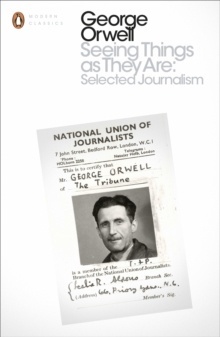Seeing Things as They Are
Selected Journalism and Other Writings

Editorial Penguin Books Ltd
Colección LONGMAN, Número 0
Fecha de edición agosto 2016
Idioma inglés
EAN 9780141984230
496 páginas
Libro
encuadernado en tapa blanda
Dimensiones 132 mm x 197 mm
Resumen del libro
George Orwell wrote, in his words, from 'a desire to see things as they are'. This new collection of his journalism and other writings, including articles, essays, broadcasts, poems, book and film reviews from across his career, shows his unmatched genius for observing the world.
Whether discussing Polish immigration or Scottish independence, railing against racism, defending the English language or holding an imaginary conversation with Jonathan Swift, these pieces reveal a clear-eyed, entertaining and eternally relevant chronicler of his age. Edited with an introduction by Peter Davison'Orwell's luminous gift was for seeing things, for noticing what others missed, took for granted or simply found uninteresting, for discovering meaning and wonder in the familiarity of the everyday... Nothing escaped or seemed beneath his notice, which was what made him such a good reporter...
Seeing Things As They Are is intended to be a collection first and foremost of his journalism, with preference given to lesser-known pieces and reviews as well as some of the poems he wrote. It is full of interest and curiosities' Jason Cowley, Financial Times'Peter Davison gives us a feast of Orwell's shorter writings, showing how from such hesitant beginnings he evolved into the writer of enduring importance we know, committed to decency, equality and political honesty, who could nevertheless wax lyrical over the first signs of spring or an imaginary English pub' Gordon Bowker, Independent
Biografía del autor
Fue en 1903 cuando Eric Arthur Blair, el escritor británico más conocido por su seudónimo George Orwell, nació en Motihari, India. Estudió en el Eton College de Inglaterra gracias a una beca, y prestó sus servicios en la Policía Imperial. Estuvo destinado en Birmania, de 1922 a 1927, fecha en que regresó a Inglaterra. Enfermo y luchando por abrirse camino como escritor, vivió durante varios años en la pobreza, primero en París y más tarde en Londres. Como resultado de esta experiencia escribió un primer libro 'Sin blanca en París y Londres' (1933), donde relata las sórdidas condiciones de vida de las gentes sin hogar. 'Días en Birmania' (1934), un feroz ataque contra el imperialismo, es también, en gran medida, una obra autobiográfica. Su siguiente novela, 'La hija del Reverendo' (1935), cuenta la historia de una solterona infeliz que encuentra de manera efímera su liberación viviendo entre los campesinos. En 1936 Orwell luchó en el ejército republicano durante la Guerra Civil española (1936-1939). El autor describe su experiencia bélica en 'Homenaje a Catalunya' (1938), uno de los relatos más conmovedores escritos sobre esta guerra y en el que se hace responsable al Partido Comunista Español (PCE) y a la Unión Soviética de la destrucción del anarquismo español que supuso el triunfo de la Falange. 'El camino a Wigan Pier' (1937), escrita en esta misma época, es una crónica desgarradora sobre la vida de los mineros sin trabajo en el norte de Inglaterra. Su condena de la sociedad totalitaria queda brillantemente plasmada en una ingeniosa fábula de carácter alegórico, 'Rebelión en la granja' (1945), basada en la traición de Stalin a la Revolución Rusa, así como en la novela satírica '1984' (1949). Esta última ofrece una descripción aterradora de la vida bajo la vigilancia constante del "Gran Hermano". Cabe citar entre otros escritos, la novela 'Que vuele la aspidistra' (1936) y 'Disparando al elefante y otros ensayos' (1950), ambas consideradas modelos de prosa descriptiva, y 'Así fueron las alegrías' (1953), un recuerdo de sus difíciles años de estudiante. En 1968 se publicaron en cuatro volúmenes sus Ensayos Completos: Periodismo y Cartas. Orwell murió de tuberculosis en enero de 1950, dejando tras de sí un profundo escepticismo por las marañas políticas








